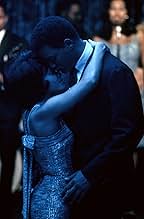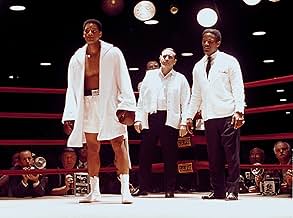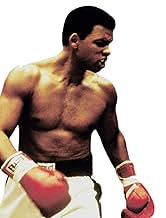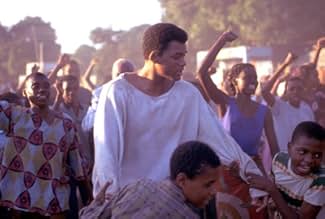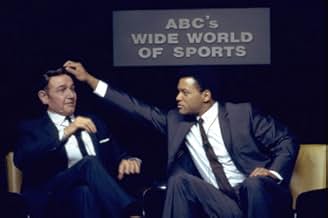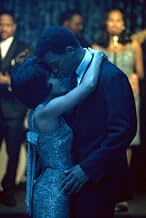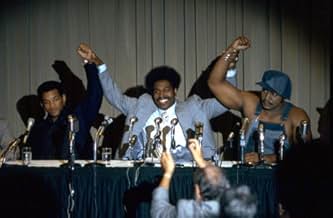A biography of sports legend Muhammad Ali, focusing on his triumphs and controversies between 1964 and 1974.A biography of sports legend Muhammad Ali, focusing on his triumphs and controversies between 1964 and 1974.A biography of sports legend Muhammad Ali, focusing on his triumphs and controversies between 1964 and 1974.
- Nominated for 2 Oscars
- 10 wins & 27 nominations total
Storyline
Did you know
- TriviaWill Smith actually turned down the role of Ali. He relented after Ali called Smith and asked him to take the role, because he was the only one as good looking as him that could play the role.
- GoofsWhen Ali starts to run in the streets of Kinshasa, a kid in the background has a modern microscooter.
- Quotes
Muhammad Ali: I ain't draft dodging. I ain't burning no flag. I ain't running to Canada. I'm staying right here. You want to send me to jail? Fine, you go right ahead. I've been in jail for 400 years. I could be there for 4 or 5 more, but I ain't going no 10,000 miles to help murder and kill other poor people. If I want to die, I'll die right here, right now, fightin' you, if I want to die. You my enemy, not no Chinese, no Vietcong, no Japanese. You my opposer when I want freedom. You my opposer when I want justice. You my opposer when I want equality. Want me to go somewhere and fight for you? You won't even stand up for me right here in America, for my rights and my religious beliefs. You won't even stand up for my right here at home.
- Crazy creditsThe Columbia Pictures logo rolls backwards.
- Alternate versionsReleased on DVD in 2004, complete with a commentary track from writer/producer/director Michael Mann, the Director's Cut of the film features roughly fourteen minutes of additional material and has roughly five minutes of content removed, running just under nine minutes longer than the Theatrical Cut. In this version,
- During the opening credits, the Initial Entertainment Group logo has been replaced by the Columbia Pictures logo, and "Initial Entertainment Group Presents, in Association with Columbia Pictures" has been replaced with "Columbia Pictures Presents, in Association with Initial Entertainment Group".
- During the opening montage, right after the scene showing Cassius Clay Sr. (Giancarlo Esposito) completing a painting of Jesus, a new scene has been added showing him attending a meeting with the Louisville Sponsoring Group and going through some paperwork. Cassius Clay Jr. (Will Smith) sits behind his father, looking bored. He then turns around and looks at a picture of a thoroughbred horse, before turning back around and looking contemptuously at the group (00:14).
- Also during the opening montage, the transition from Sam Cooke (David Elliott) to Angelo Dundee (Ron Silver) reading a newspaper is slightly longer on each side of the edit (00:03).
- Also in the opening montage, after Howard Bingham (Jeffrey Wright) and Dr. Ferdie Pacheco (Paul Rodriguez) enter the gym, there is more footage of Cooke greeting the crowd and singing to specific people (00:14).
- Still in the opening montage, as Ali spars in the ring, there is an additional shot of Bingham taking photographs and then a shot of Ali dodging his sparring partner's jabs (00:04).
- The high elevation shot of the ring at the start of the fight with Sonny Liston (Michael Bentt) has been trimmed (-00:02).
- At the end of the third round against Liston, the shot of him returning to his corner and sitting down is absent (-00:06).
- The shot of Malcolm X (Mario Van Peebles) leaving the arena after Ali defeats Liston is longer and occurs during Ali's speech, whereas in the Theatrical Cut, he leaves before Ali starts speaking (00:02).
- There is an additional scene in between Ali's victory and his visit to Malcolm's apartment. In this scene, the Louisville Sponsoring Group have organized a celebration party for Ali. We see Cassius Sr., Bingham, Pacheco, Luis Sarria (Laurence Mason), and Drew 'Bundini' Brown (Jamie Foxx) drinking and celebrating. Jimmy Cannon (Kim Robillard) then approaches one of the management group and asks where Ali is. He's assured that Ali will be there shortly. We see Howard Cosell (Jon Voight) smoking a cigar, and the film then cuts to an exterior shot of Malcolm's apartment, before cutting inside (00:32).
- The scene of Ali and Malcolm walking around Harlem is longer. After Ali says, "hold on, I'm doing the rhyming", he stops a boy and says, "You wanna see how fast I am?" He then gets the boy to hold his hand up, and says that he will punch it six times before the boy can count to three. Ali gets into a fighting stance and tells the boy to count. When the boy reaches three, Ali, still in the same stance, says "Did I hurt you?" and the crowd laugh and cheer (00:23).
- The scene between Ali and Elijah Muhammad (Albert Hall) is longer. After Elijah tells him that his new name is Muhammad Ali, there is some additional dialogue, with Elijah telling Ali, "up until now, I have entrusted your spiritual development to brother Malcom. I do not think that is a wise choice anymore." Ali pauses for a moment, and then nods in agreement (00:15).
- Immediately after this scene, the scene between Ali and Cassius Sr. is longer. The scene opens with Cassius Sr. asking "what's wrong with the managers and lawyers I got you? They're the best white men I could find, right here in Louisville." Ali says he wants black managers and lawyers and so has gotten Chauncey Eskridge (Joe Morton). Cassius Sr. says of Ali's previous managers, "they saved you from the gangs, from the hyenas, from the jackals of boxing, never cheated you, protected you with a trust fund." Ali asks, "Why do I need protecting from myself?", and Cassius Sr. says "so I gotta go tell them to p*#s off, Cassius don't want you around no more." Ali responds with, "I ain't one of their thoroughbreds or one of their little charity things". Ali then tells his father about the name change. (00:48).
- After Malcolm is told his suspension has been extended, the film cuts to an exterior shot of a building in Nigeria. In the Director's Cut, the shot of the building is shorter, as is the next shot, which shows CIA agent Marlin Thomas (Brad Greenquist) ascending a flight of stairs. Because of this trimming, part of the voiceover conversation between Malcolm and his wife Betty (Victoria Dillard) is absent, specifically the line where Malcolm says he got a little doll for his daughter (-00:05).
- The scene where Ali goes to the cockpit of the plane is different in both versions. In the Theatrical Cut, after Ali asks "what you all done with the real pilot", the pilot (Bradford E. Lang) replies, "I am the real pilot." He then invites Ali to sit down. In the Director's Cut, after Ali asks what happened to the real pilot, there is a cutaway to someone on the plane looking up towards the cockpit, and when the film cuts back, the pilot is inviting Ali to sit down, thus missing the "I am the real pilot" line. There is no time differentiation.
- The scene of Ali being driven in an open top car and waving to the people is shorter, with less cutaways to the pedestrians (-00:04).
- Immediately after the above scene, a shot from behind of Malcolm and his companions walking down the hotel driveway is absent (-00:03).
- During the conversation between Ali and Malcolm in front of the hotel, the Theatrical Cut shows a scene of the CIA agents watching from a room. We get several close-ups of the men, including a shot of one stirring a cup of tea, and another shot showing they are armed. The film then cuts back to Ali and Malcolm. In the Director's Cut, however, the various close-up shots of the CIA agents are absent. Instead, the camera pans across to show Agent Thomas on the phone. The phone is answered by Agent Bradley (Bruce McGill), and Thomas says, "You'll never guess who our guy ran into." Bradley says he'll have to ring Thomas back. A screen caption then tells us we are in the Republic of Congo. Bradley and a uniformed military officer (Richard Katanga) speak French and shake hands. The military officer heads outside, and we see several men held prisoner with a firing line setting up behind them. The officer then makes a phone call, and a soldier answers on a radio, He listens for a moment, and then runs up to Major General Joseph Mobutu (Malick Bowens) and says something to him in French. Mobutu then enters a room and proudly says "it is done" (in French). The people in the room (all military officers) then applaud. The scene cuts back to Bradley returning Thomas's call, with Thomas telling him that Malcolm has met Ali, and Bradley saying he thought their relationship was finished. He then says, "You stay with Clay. We'll pick up Malcolm ourselves in Liberia" (01:54).
- In the scene after Ali tells Herbert Muhammad (Barry Shabaka Henley) that he wants to marry Sonji Roi (Jada Pinkett Smith), there is a scene of Ali training, and in the background, the meeting between Malcolm and Martin Luther King (LeVar Burton) can be seen on TV. In the Director's Cut, there are several more shots of the meeting (although no dialogue is heard). As Malcolm and King go their separate ways, it is revealed that they are being secretly watched and photographed (00:24).
- During the scene between FBI agent Smiley (Ted Levine) and Joseph 13X (Leon), Smiley's pause after telling Joseph he wants Elijah to take Malcolm back into the Nation of Islam has been trimmed (-00:02).
- In same scene, the shot of Smiley standing up and saying, "get me receipts, I'll reimburse you for your dry cleaning" is absent (-00:05).
- After Malcolm welcomes the crowd to his speech, the shot of Ali driving through an underpass has been trimmed (-00:03).
- Immediately after the second Liston bout, the shot of Dundee cutting off Ali's hand wrapping has been trimmed (-00:03).
- After Cassius Sr. says to Ali, "you don't know your name or who you are," a shot of Herbert watching them leave the room is absent (-00:03).
- Immediately after the above scene, the shot of Ali holding Sonji's shawl to his face has been trimmed (-00:08).
- During the interview with Cosell, the shot of Cosell holding his wig and saying "we'll be right back" has been trimmed (-00:01).
- During the conversation between Ali and Cosell backstage, after Cosell says, "they're coming after you because they're scared of black militancy in the inner cities", there is some additional dialogue. Cosell says, "They will make an example out of you", and Ali replies, "Example of what? Some good negro who do what he told?" Cosell replies, "Yes, and to demonstrate here's what happens to your ass if you don't" (00:19).
- Prior to the draft scene, a shot of Ali, Herbert, and Eskridge walking across the lobby of the building is absent (-00:08).
- Immediately after the draft scene, the scene of Ali driving through a parking lot full of reporters is longer, with several additional shots from inside and outside the car (00:13).
- Following the above scene, the scene of Ali and his entourage ignoring reporters as they approach his apartment is longer, showing a bodyguard preventing the reporters from coming too close to the apartment door (00:09).
- After Ali tells a reporter that he has no beef with the Viet Cong, he says, "I ain't got to be what nobody else want me to be, and I ain't afraid to be what I wanna be. Think how I wanna think," In the Theatrical Cut, this is followed by a shot of Bingham looking at Ali as Ali loosens his collar. In the Director's Cut, right after his line, the film cuts to a new scene in which Robert Lipsyte (David Cubitt) tells Ali, "you're being denounced by Nixon, republicans, boxing commissions in New York, Cleveland, LA. But you're also getting a tag as unpatriotic by the NAACP, by Roy Wilkens, Jackie Robinson, New York Times, Joe Lewis." A stoic Ali doesn't respond (00:32).
- After Ali is found guilty and sentenced, the shot of him in the courthouse lobby shaking hands with the security guards is absent (-00:18).
- During the montage in which Ali meets Belinda Boyd (Nona Gaye), the shot of him crossing the street right before he has his meeting with Eskridge has been trimmed (-00:03).
- Right after their meeting, the shot of Eskridge waving goodbye to Ali has been trimmed, as has the next shot, showing Ali jogging (-00:03).
- Immediately after this scene, the shot of Ali and Belinda in bed has been trimmed, with some of the dialogue now occurring as voiceover atop the previous scene (-00:03).
- In the same scene, the shot of Ali and Belinda in bed as she kisses him and he teases her about trying to make up with him is longer (00:14).
- At the end of this same scene, the shot where Belinda gets their baby from the crib has been trimmed and now ends with her off screen; the shot of her sitting down beside the crib and feeding the baby is absent (-00:06).
- In the Theatrical Cut, the film cuts from Belinda feeding the baby, to a series of archival shots of rioting, inter-cut with Ali, Bingham, and several other people looking at the TV as it reports on the violence. The film then cuts to Eskridge and Ali speaking on the phone. In the Director's Cut, the film cuts directly from Belinda to the phone conversation, with the archival footage and the reaction shots of Ali and Bingham pushed back until the end of the scene in which Martin Luther King is killed (putting it here makes a lot more sense). The shots of Ali looking at the TV have also been trimmed (-00:05).
- The scene in which Ali, Belinda, and Bingham watch Joe Frazier (James Toney) on TV is longer. After mocking Frazier, Ali notices that his daughter's nappy needs changing. Belinda jokingly says, "Try changing her, do it for the experience." Ali replies, "well, you know, I was gonna change her, but then I remembered I didn't want to" (00:22).
- In the same scene, after Ali calls Cosell's show, the shot of him looking at Belinda is absent (-00:02).
- Immediately after the above scene, the shot of Ali working out on a speed bag is absent (-00:12).
- In the Theatrical Cut, right after the above scene, the film cuts to a scene where Elijah suspends Ali from the Nation of Islam. It then cuts to Ali and Bingham confronting Bundini, before showing several shots of Ali riding a train. In the Director's Cut, however, the film cuts from Ali hanging up the phone straight to the confrontation with Bundini. The scene of his suspension from the Nation then occurs during the shots of Ali on the train (again, this placement makes more sense). Additionally, the line where Elijah says, "he may have no conversation with any Muslim whatsoever" is absent (-00:05).
- In the same scene, the shots of Ali on the train have been edited differently, with some shots trimmed and some extended. An alternate take of Ali rubbing his eyes has also been used - in the Theatrical Cut, the shot is from behind him facing the back door of the train; in the Director's Cut, it is from in front (-00:04).
- Immediately after the above scene, a shot from in front of Ali as he approaches Cosell is absent (-00:03).
- In the same scene, after Ali and Cosell go to speak, the shot of the stadium has been trimmed, specifically the shot of the floodlight (-00:02).
- During the scene in which Ali accepts Bundini back, there are several additional shots of Ali training before Bundini comes into the room (00:08).
- After the fight against Jerry Quarry (Robert Sale), the scene where Herbert approaches Ali backstage and Belinda reminds him that "you don't need them" has been trimmed (-00:06).
- The dinner scene during which Cosell calls Ali to tell him his conviction has been overturned is shorter, missing several seconds of the phone ringing, then being answered, and then handed over to Ali (-00:17).
- At the start of the first Frazier fight, the shot of the mic lowering down into the ring is absent (-00:02).
- During Ali's introduction at the start of the fight, some shots of the crowd are absent, as is the announcer's line, "with a record of thirty-one and oh, with twenty-five knockouts". Similarly, during Frazier's introduction, more crowd shots are absent, as is the announcer's line, "with a record of twenty-six and oh, with twenty-three knockouts" (-00:07).
- In the Theatrical Cut, after the Frazier fight, there is a shot of Ali standing with his arms on the ropes and looking out into the crowd. This shot is absent in the Director's Cut, but a new scene has been added. Backstage after the fight, we see Ali getting his hand wraps removed. He asks where Belinda is and Pacheco tells him she's at the first aid station as she felt a little dizzy. Ali then says to Dundee, "feet was in the sand, my hands was in water." Dundee considers what to say, before pointing out, "We needed more time between Quarry and this. You know, after three-and-a-half years..." Ali looks at him and Dundee doesn't say anything else. Ali then gets up and says, "where's that aid station", before leaving the room. A concerned Dundee watches him leave (00:50).
- After watching George Foreman (Charles Shufford) beating Frazier on TV, there is a shot of Ali looking concernedly at the screen. This shot is absent in the Director's Cut, but two new scenes have been added. The first scene depicts the second fight between Frazier and Ali, which Ali narrowly wins on points. This is followed by a scene in a restaurant with Ali and his team discussing a possible Foreman fight. Pacheco points out, "Foreman is 22; you're 34 years old. I don't want to see your head become someone's bulls eye." Ali then asks Dundee, "You think I still got the tools?" to which Dundee yes, "yeah, sure you do. You still got the tools daddy. But they're different." Ali contemplates this for a moment, and then says, "well, we better sharpen them up because we going to Africa." The group celebrate and Dundee tries to take away Ali's pie, saying "no girls, no pies champ", to which Ali says "I'll bite you off at the elbow if you touch my pie" (01:52).
- The press conference with Ali, Foreman, and Don King (Mykelti Williamson) has been extended. After Ali says, "you must have studied the whole D section of the dictionary", Cosell says, "George Foreman demolished two of your most difficult opponents. Isn't it intimidating to you in some way to have to face such a reality?" Ali reacts by challenging Cosell to a fight, and Cosell accepts. The two square up to one another in front of the conference table and Ali says, "Cosell, I've been holding back for years. Every time I see you, you're out here talking, using big words that you know I don't understand, you're saying stuff to me always, you asked me the last time was I truculent." Everybody laughs. Cosell says, "Well, did you finally find out what that word means?" Again everybody laughs, and Ali says, "Cosell, I've seen you doing interviews on your TV show, and I've realized you don't know nobody as famous as me. You don't know nobody. Nobody would know who you were if it wasn't for me." Cosell disagrees, so Ali asks the crowd, and points out, "all these cameras, all these people writing down everything I say, and when people look it up and when they read it in their newspapers, folks write it down and folks looking at it, it's gonna say Muhammad Ali and some strange white man." Again, everyone laughs, including Cosell himself (01:25).
- Right after Ali changes his route when he is out jogging, there is a shot of a door with "Babilonia House" written on it. A quick shot of Ali reacting to this is absent (-00:01).
- Immediately after this, the montage scene of Ali running through the slums has been changed, with the shots in a different order, and several shots either missing, or trimmed (-00:12).
- The first shot of the mural depicting Ali defeating military planes and tanks is longer. There is also additional footage of Ali looking at the mural in awe, and some of the shots are in a different order (00:08).
- Immediately after the mural scene, the scene where Ali jogs in slow motion past a dilapidated apartment block features several shots that have been trimmed (-00:04).
- During their argument, the shot of Ali looking at Belinda after she says, "I just want to know why my Muslim husband is allowing himself to be strung up on a cross" has been trimmed, and a shot of Belinda trying to hold back tears after Ali walks out is absent (-00:07).
- Immediately after the argument, there is a new scene. Ali is sitting alone waiting for the press conference to begin and he calls Cosell over to him, asking "how many of you ugly sportswriters in there got me over Foreman?" Cosell smiles kindly, and says, "how are you gonna dance against George? He's sparring with a fast middleweight, training to cut you off. He gets you against the ropes, he can knock you out with either hand." Ali contemplates this, but doesn't answer (00:32).
- The opening few lines of dialogue from the press conference are absent; "this fight is no contest; he is entirely too slow to fight me. I say that George Foreman is a mummy. He's too slow" (-00:07).
- During the press conference, when Cosell asks Ali if he is still the man he used to be, and Ali makes a joke about Cosell's wife, there is an additional shot of Ali playfully winking at Cosell, and a longer shot of Cosell laughing (00:03).
- As King approaches Ali to tell him that Foreman has been hurt, two shots of him crossing the field are absent (-00:06).
- After speaking to King about Foreman, the scene of Ali watching the dance rehearsals has been edited differently, and different shots have been used. There is no time differentiation.
- After the press conference, a few brief shots of Ali and his team sitting at a cafe have been removed (-00:02).
- After Ali meets Veronica Porche (Michael Michele), the scenes of Ali and Foreman working with their respective sparring partners have been reversed. In the Theatrical Cut, we see Ali first and then Foreman, but in the Director's Cut, we see Foreman first and then Ali. There is no time differentiation.
- Immediately after Ali is finished training there is an additional scene. We see him cooling down as the crowd cheer. Then we see him and Bundini fooling around with Foreman's coach. This is followed by a shot of Bradley as he walks towards the gym exit. A reporter approaches him and says (in French), "you are from the American embassy. Do you have a prediction?" Bradley smiles and replies (also in French), "I am from the American Information Agency. I'm not permitted to express my preference between two US citizens." He then drops the smile and says, "D'accord?" before he walks away (01:03).
- During the scene where Belinda questions Ali about Veronica, she asks him if he loves her and he says he doesn't know. Her reaction shot has been trimmed, as has the shot of her leaning against the wall after Ali leaves (-00:06).
- Immediately after this, the shot of Ali in the shower has been extended (00:04).
- The scene between Bradley, Mobuto, and Idi Amin (Themba Gasa) is shorter, with a couple of shots trimmed, including the shot of the waiter approaching the table, the shot of the three men sitting down, and the shot of the waiter walking away from the table (-00:04).
- The scene immediately before Ali goes to the ring in different in both versions of the film. In the Theatrical Cut, there is a shot of him being picked up from his apartment and driving away with a motorcycle escort. In the Director's Cut, this scene is absent, and is replaced by a scene in his locker room. Ali is told there is four minutes left, and Dundee asks him if he's alright. Ali says he is. He then says, "George Foreman ain't no mummy. He done knocked out eight out of eleven before the end of the third round. Most dangerous fighter I ever fought." Dundee nods, and says "alright, I'd worry if I was hearing anything else." Bundini then comes into the locker room and says, "Forget every battle of man against man, of mind against mind, of soul against soul. This is the one. This is it. This is the greatest. The prophet has come back to claim his own and get the pretender off that throne." They then do the "rumble young man rumble" chant and they all leave (00:33).
- The sequence of Ali bouncing around the in ring so as to warm up has been trimmed with the removal of several shots (-00:16).
- The sequence when Dundee asks the referee where Foreman is, and then goes to Ali and says, "George is jerking us off, making us wait" is absent (-00:15).
- When Foreman is being counted out, both versions are edited slightly differently. In the Theatrical Cut, we see a shot of a worried Dundee; in the Director's Cut, the shot of Dundee is shorter, and then cuts to a shot of the crowd. There is no time differentiation.
- SoundtracksTwisting the Night Away
(Sam Cooke Medley)
Written by Sam Cooke
Produced by Trevor Horn and Michael Mann
Performed by David Elliott
Published by Abkco Music, Inc.
He was a conscientious objector against the Viet Nam war, yet he is honored by presidents of the nation he refused to capitulate with in crimes against humanity. His story is that vital to America.
When Ali was still a teenager, he tried his best to prove his personal excellence in a society prejudiced against black people. He won the boxing gold medal at the Rome Olympics in 1960, yet he came home to Louisville and still wasn't "good enough" buy a sandwich at a white restaurant, because he was black.
He then decided if the gold medal wasn't good enough for America, then it wasn't good enough for him. At this point in his life, when he had nothing else; he took the gold medal and threw it in the river.
He observed the wrestler, Gorgeous George, and admired the way he used the negative energy generated by those who disapproved of him as fuel to become the top attraction and make fools of all those who were against him. He wanted to make people boo him. He proclaimed himself as more beautiful than any creature on the planet. He told the world he was the greatest who ever lived. The more they booed him, the more energy it gave him.
He didn't have a mentor or a manager. He assembled a group of Louisville investors to bankroll him, all by himself. He knew exactly what he wanted from the world, reached out and took it. He made a crown out of it. Nobody gave him anything, and nobody can ever take that away.
He discarded the name of a great white civil rights leader during the civil war and reasoned that if he was really free to be what HE was, then he should take a name that he thought was a natural black person's name. It didn't make sense for others who came before him to fight and win the rights to do whatever they wanted, if they were then going to do nothing but turn around and say "Thank You". He decided in order to validate the fight for freedom, his role was to be free.
Muhammad Ali is played by the maybe the only person in the universe who would dare to even attempt it and he succeeds marvelously; not just in a marginal way, but in a big, big way.
This film isn't just swagger, or an imitation of Ali. This is a deep, sensitive, poignant, and romantic story about one of the greatest public figures of the twentieth century. This man truly is a poet and he's lived the life of a poet. To a great extent, Muhammad Ali made his life a manifesto of truth about the American experience. Of all the stories of the twentieth century in America, this was one of the most important ones to tell.
This film has characters galore: from Jamie Foxx as Bundini Brown, who keeps chanting "float like a butterfly, sting like a beeee!" when everyone in the world thought Ali was going to die at the hands of Sonny Liston; Jada PinkettSmith as Ali's devoutly religious and adoring first wife; MichaelMichele playing Veronica Porche, a beautiful jet set model with whomAli had an affair, to a strong performance by Mario Van Peebles as Ali's conscience; Malcolm X, who forces Ali to think against himself and his adoring Black Muslim following in the interests of right and wrong.
This film has irony, choreography, conflict, humor, drama; and accurately portrays the highest highs of any public figure I've seen in my lifetime, as well as some of the most bitter defeats.
This is about male psychology. This is about female psychology. This is about a religious movement in America. This is about a culture in America and many cultures in America and their struggles to live together and treat each other right and fairly, while trying to do the right thing as concerns their own conscience.
The most glaring weaknesses of any sports film ever made are in the sport scenes themselves. This is the strongest point of this film and also makes it the greatest sports film ever made.
I've been a boxing fan since I was eleven. I was a part of crowds who gathered around Muhammad Ali before he became champion. I know what he looks like face to face. I've watched his boxing films dozens of times, and I'll tell you that the scenes in this movie are perfect reenactments of what actually happened in the ring. This couldn't have been done in less than dozens of takes per scene. They throw punches exactly like the fighters in the real fights. They're in the same part of the ring when they throw those punches. They react to the punches the same way. They even get knocked down in the correct parts of the ring in exactly the same way as the fighters who were in the original fight.
I'm not going to comment on whether it should have won an Oscar for best picture, best actor, best supporting actor, best direction, best photography, best choreography, or other features in the film. Maybe it's better that it didn't win those awards in that year because this film is bigger than any year.
This is the sports film that all others will be judged by from here on out by anyone with any sense of realism and art in movies.
This is one for the ages.
Details
- Release date
- Country of origin
- Official site
- Languages
- Also known as
- Алі
- Filming locations
- Production companies
- See more company credits at IMDbPro
Box office
- Budget
- $107,000,000 (estimated)
- Gross US & Canada
- $58,203,105
- Opening weekend US & Canada
- $14,710,892
- Dec 30, 2001
- Gross worldwide
- $87,812,729
- Runtime2 hours 37 minutes
- Color
- Sound mix
- Aspect ratio
- 2.39 : 1
- 2.35 : 1
Contribute to this page








